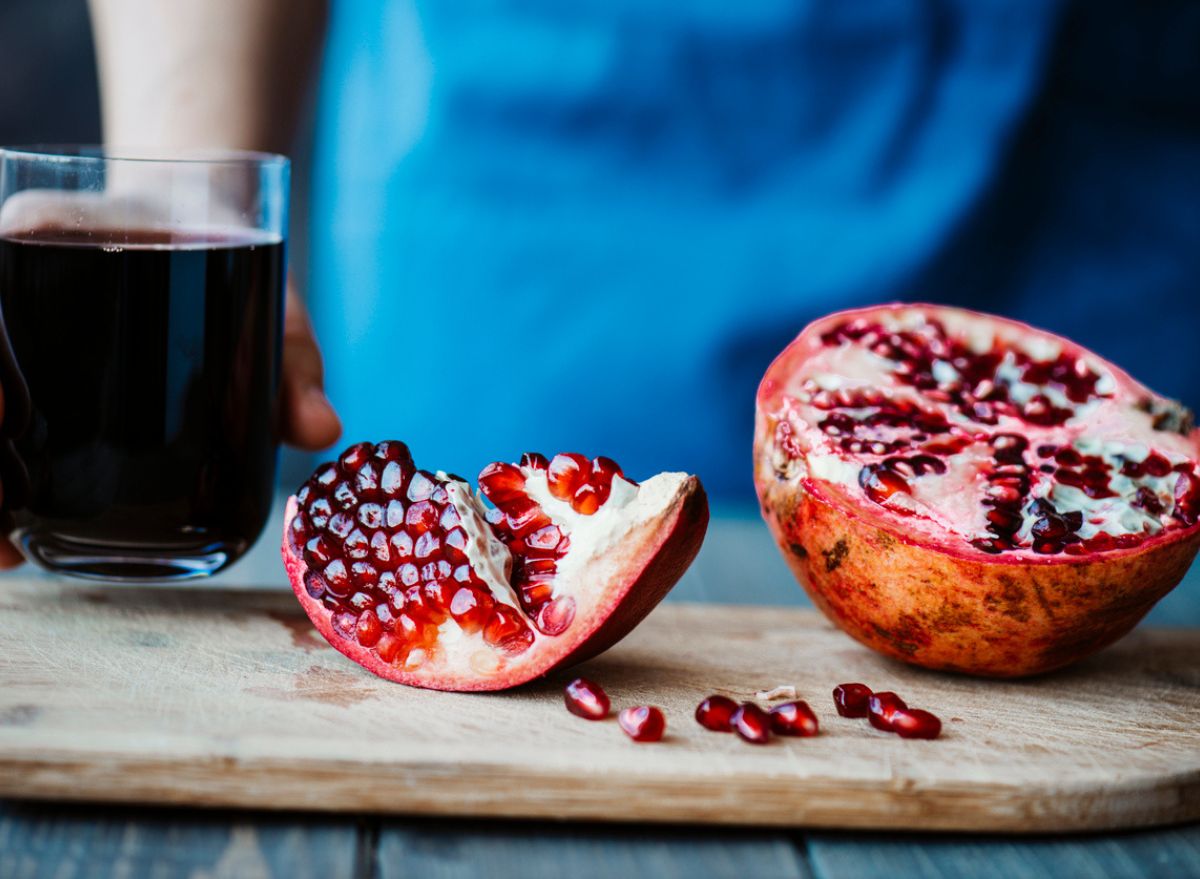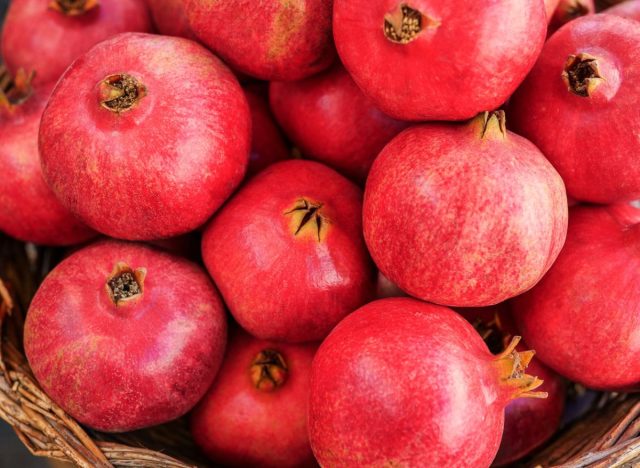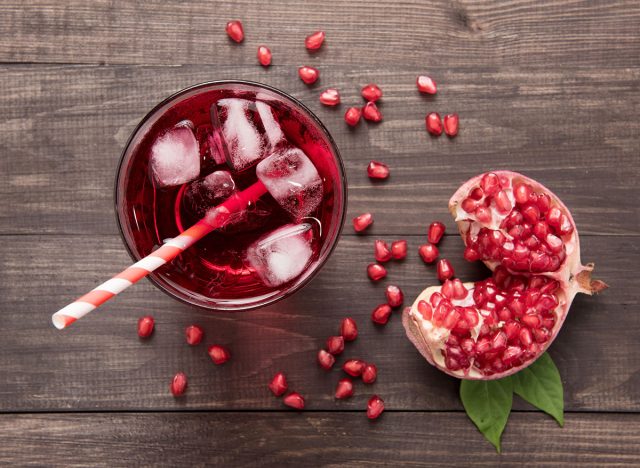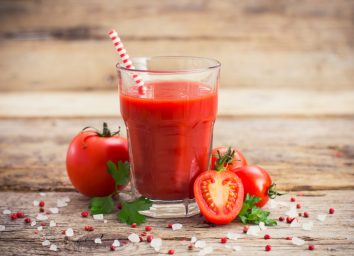What Happens to Your Body When You Drink Pomegranate Juice

Fruit is not just a deliciously sweet and easy-to-eat snack that you can take basically anywhere. It's also packed full of health benefits, with each type of fruit providing its own unique blend of nutrients and antioxidants. One particularly powerful fruit—pomegranate—is chock-full of antioxidants that help reduce inflammation, fight free radicals, lower high blood pressure, and reduce cholesterol levels.
But anyone who loves pomegranate knows that it can also be fairly difficult to eat. To solve this problem while still getting all of the health benefits, you could try drinking pomegranate juice. This type of juice is delicious enough to enjoy on its own, or as a mixer for your favorite cocktail or tea drink. However, when looking for a pomegranate juice to drink, make sure you buy 100% juice and not something from concentrate, which is often labeled as a "juice cocktail" and loaded with added sugar.
Read on to learn more about the health benefits of drinking pomegranate juice, and for more, don't miss these Surprising Effects of Drinking Cranberry Juice, Says Science.
It may help those with type 2 diabetes.

Pour yourself a fresh glass of pomegranate juice, because research shows that this beverage may be helpful for those who have type 2 diabetes. According to a study published in BMC Nutrition, combining pomegranate juice with aerobic training lowered the risk factors of type 2 diabetes in diabetic men. For example, it lowered anthropometric indices, which includes measurements like BMI and waist circumference, as well as reduced liver enzymes and insulin resistance. It's important to note that this study used pomegranate juice that was sugar or additive-free.
It may improve your heart health.
According to our dietitians, 100% pomegranate juice is quite possibly one of the best juices you can have for your heart.
"Pomegranates are a source of potassium, which is one nutrient that is important when supporting heart health. Data shows that increasing potassium intake may reduce the risk of developing cardiovascular disease," says Lauren Manaker, MS, RDN, author of The First Time Mom's Pregnancy Cookbook and Fueling Male Fertility.
Not only can it help in providing important nutrients like potassium, but according to Rachel Fine, RDN and founder of To The Pointe Nutrition, "Some research shows benefits of drinking pomegranate juice for improvements in blood pressure," which is an important factor when it comes to protecting your heart. In fact, the CDC notes that high blood pressure can contribute to heart-related complications like increased risk of stroke, heart disease, and heart attacks.
You might even reduce your cancer risk.
"Pomegranate juice contains an antioxidant called anthocyanin, and consumption of this antioxidant is linked to a reduced risk of developing certain cancers," says Manaker.
According to the British Journal of Pharmacology, anthocyanin's effects against cancer have to do with its anti-inflammatory, anti tumor, and antioxidant properties, as well as its potential ability to kill cancer cells. Food & Nutrition Research states that aside from pomegranate, anthocyanin can be found in things like berries, tropical fruits, leafy green vegetables, purple potatoes, and even black rice. Even though other types of food and drinks are rich in antioxidants, UCLA researchers say that pomegranate juice is so full of antioxidants that it has more than most other drinks on the market.
It can help you stay hydrated.

It's important to stay as hydrated as possible. According to Nutrients, hydration is key in overall health maintenance, and some research backs up its connection to cognitive health, kidney health, and weight management. Harvard T.H. Chan School of Public Health also says that along with cognitive health, staying hydrated helps with mood and sleep as well. Dehydration, on the other hand, has been found to potentially age you faster and increase your risk of mortality from chronic disease.
While water is always the most crucial drink for hydration, having other hydrating, nutrient-dense beverages on hand can be helpful in maintaining a consistent state of being hydrated. "Pomegranate juice is a liquid, and as such, drinking it can help people meet their fluid needs," says Manaker.
It can help you manage chronic inflammation.
There's another potential outcome that can come from pomegranates having such a high antioxidant content—they may help fight against inflammation.
"Thanks to the polyphenol antioxidants, drinking pomegranate juice may help combat chronic inflammation," says Manaker.
Research has shown that one of the ways these antioxidants can fight inflammation is by working with certain proteins involved in cell signaling, which can ultimately be protective against certain chronic diseases.
Furthermore, a 2020 review published in Antioxidants concluded that although there are definitely anti-inflammatory effects of polyphenols, researchers believe that these antioxidants may serve as more beneficial in preventing incidences of chronic inflammation or inflammatory diseases mores than fixing the issue once it has arrived. In other words, your pomegranate juice may better at helping to prevent inflammation than it would be in treating it.
You may improve your memory.

One newer, lesser-known potential benefit of drinking pomegranate juice is that it may help with certain aspects of your memory as you age.
"More recent research shows that a glass of pomegranate juice might help to slow declines in visual memory among older adults, but did not show improvements in other markers of memory and cognition when compared to a placebo," says Fine.
The researchers attribute pomegranate juice's memory-aiding properties to its ability to prevent the effects of free radicals on your neuronal and brain health. Free radicals are molecules in the body that, if allowed to overgrow, can cause damage to surrounding cells. Antioxidants, like those found in pomegranates and other produce, neutralize free radicals and keep them from causing damage.
A previous version of this story was published on July 21, 2022. It has been updated to include additional copy and proofreading revisions, additional research, and updated contextual links.








